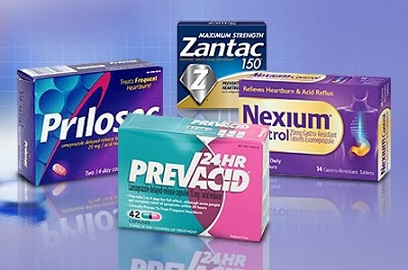Health News: University Of Minnesota Study Finds That Long-Term Use Of PPIs For Gastric Reflux Linked To Higher Risk Of Developing Dementia!
Thailand Medical News Team Aug 10, 2023 2 years, 6 months, 3 days, 23 hours, 44 minutes ago
Health News: In the complex landscape of medical research, each breakthrough uncovers new layers of understanding, leading to a deeper appreciation of the intricate interplay between medications and human health.

Recent investigations have turned their gaze toward the potential connection between extended use of proton pump inhibitors (PPIs) - medications commonly prescribed for managing acid reflux and gastroesophageal reflux disease (GERD) – and the risk of dementia.
Previous
Health News coverages by Thailand Medical News has showed that PPIs are linked to various adverse long-term health issues.
https://www.thailandmedical.news/news/proton-pump-inhibitors-ppis-increases-risk-of-fatty-liver-disease-by-disrupting-gut-microbiome-balance-according-to-korean-study
https://www.thailandmedical.news/news/ppis-or-acid-reflux-drugs-affects-cognitive-abilities-of-breast-cancer-survivors
https://www.thailandmedical.news/news/study-finds-another-negative-side-effect-of-ppi-usage,-this-time-linked-to-increased-risk-of-acute-gastroenteritis
https://www.thailandmedical.news/news/more-bad-news-for-users-of-proton-pump-inhibitors-(ppis),-as-these-gastric-reflux-drugs-are-implicated-in-cholangitis
https://www.thailandmedical.news/news/more-studies-emerging-that-ppis-(proton-pump-inhibitors)-linked-to-increased-risks-of-deaths
https://www.thailandmedical.news/news/as-evidence-of-damage-from-long-term-ppi-use-mounts,-thai-medical-providers-should-rethink-strategies-to-treat-acid-reflux
https://www.thailandmedical.news/news/new-study-links-ppis-to-kidney-disease-and-failure
A pioneering study conducted by a team of experts at the University of Minnesota School of Public Health has illuminated this intriguing relationship, sparking a discourse that calls for a more profound exploration of the impact of prolonged PPI usage on cognitive health.
Acid
Reflux and PPIs
Acid reflux, a widespread ailment afflicting millions worldwide, is characterized by the regurgitation of stomach acid into the esophagus, resulting in discomforting symptoms such as heartburn, ulcers, and inflammation. Over time, persistent acid reflux can escalate into GERD, a condition that, if left unmanaged, heightens the susceptibility to esophageal cancer. Proton pump inhibitors play a pivotal role in the management of these conditions, working by diminishing stomach acid production through targeting specific enzymes in the stomach lining. This targeted action has solidified PPIs as a cornerstone of therapeutic strategies to mitigate the distressing manifestations of acid reflux.
The University of Minnesota Study
The research by the study team led by the University of Minnesota marked a significant advancement in understanding the potential correlation between prolonged PPI use and the emergence of dementia. The research scrutinized a cohort encompassing 5,712 individuals aged 45 and older, each of whom was devoid of any signs of dementia at the commencement of the study. With an average age of 75, the participants were observed over a median period of 5.5 years to monitor the manifestation of dementia-related symptoms.
The research methodology was meticulous, involving the categorization of participants based on the duration of their PPI use. These categories spanned non-users, short-term users (up to 2.8 years), intermediate users (2.8 to 4.4 years), and long-term users (more than 4.4 years). By rigorously examining medication histories gathered during periodic study visits and annual phone calls, the researchers aimed to unravel any potential nexus between protracted PPI utilization and the onset of dementia.
Noteworthy Revelations and Subsequent Implications
Among the participants, a total of 585 individuals (equivalent to 10% of the baseline population) eventually developed dementia during the course of the study.
The analysis yielded a significant revelation: those who had employed PPIs for over 4.4 years faced a 33% higher risk of dementia compared to those who had never utilized PPIs.
However, it is imperative to underscore that the study's findings, while suggestive of an association, do not establish a definitive causal link. Instead, they serve as a clarion call for further research, urging the medical community to embark on a journey of elucidating the intricate relationship between prolonged PPI use and the potential implications for cognitive health.
Acknowledging the Study's Limitations
While the study contributes significantly to the dialogue surrounding PPI use and dementia risk, it is essential to acknowledge the study's inherent limitations. The reliance on annual assessments of medication usage introduces the possibility of inaccuracies, particularly for participants who intermittently suspended and resumed PPI use between evaluations. Furthermore, the scope of the study was unable to encompass over-the-counter PPI use, potentially impacting the precision of the findings.
Interpreting Insights From Experts
Dr Kamakshi Lakshminarayan, the study's lead author and a distinguished member of the American Academy of Neurology, emphasizes the need for further research to validate and expand upon these findings. While she acknowledges the vital role of PPIs in managing acid reflux, she underscores the importance of a balanced approach that weighs the benefits against the potential risks of prolonged usage. Lakshminarayan encourages individuals to engage in informed discussions with their healthcare providers, fostering an environment of shared decision-making regarding potential alterations to their treatment regimen. Nonetheless, there exists a cohort of experts who adopt a more cautious stance.
Dr Andrew Chan, a prominent researcher hailing from Harvard Medical School, articulates reservations about the study's conclusions, underscoring the lack of a clear linear relationship between PPI usage duration and dementia risk. Dr Chan posits that patients should approach these findings with a sense of prudence, refraining from hastily interpreting them as conclusive evidence of a causal connection between PPI use and dementia.
In Conclusion
The University of Minnesota study constitutes a significant contribution to the ongoing discourse concerning the potential repercussions of prolonged PPI use. It serves as a clarion call for a comprehensive approach to managing acid reflux and its related manifestations, wherein the benefits and potential risks of extended PPI use are subject to meticulous evaluation. As scientific knowledge continues to evolve, healthcare providers and patients are urged to engage in candid and well-informed dialogues about treatment options. Through these conversations, individuals can make discerning decisions that prioritize their holistic health and well-being.
The study's findings underscore the imperative of future research to comprehensively unveil the nuanced relationship between prolonged PPI use and dementia. By shedding light on this potential link, the medical community can refine clinical practices, fostering a patient-centric approach that remains attuned to both the benefits and potential risks of prolonged PPI usage.
The study findings were published in the peer reviewed journal: Neurology.
https://n.neurology.org/content/early/2023/08/09/WNL.0000000000207747
For the latest
Health News, keep on logging to Thailand Medical News.
Read Also:
https://www.thailandmedical.news/news/u-s-study-shows-that-users-of-proton-pump-inhibitors-or-ppis-have-higher-mortality-risk-when-infected-with-covid-19
https://www.thailandmedical.news/news/covid-19-warning-malaysian-led-research-shows-that-gastric-reflux-drugs-ppis-linked-to-increased-risk-of-severe-or-fatal-covid-19-outcome
